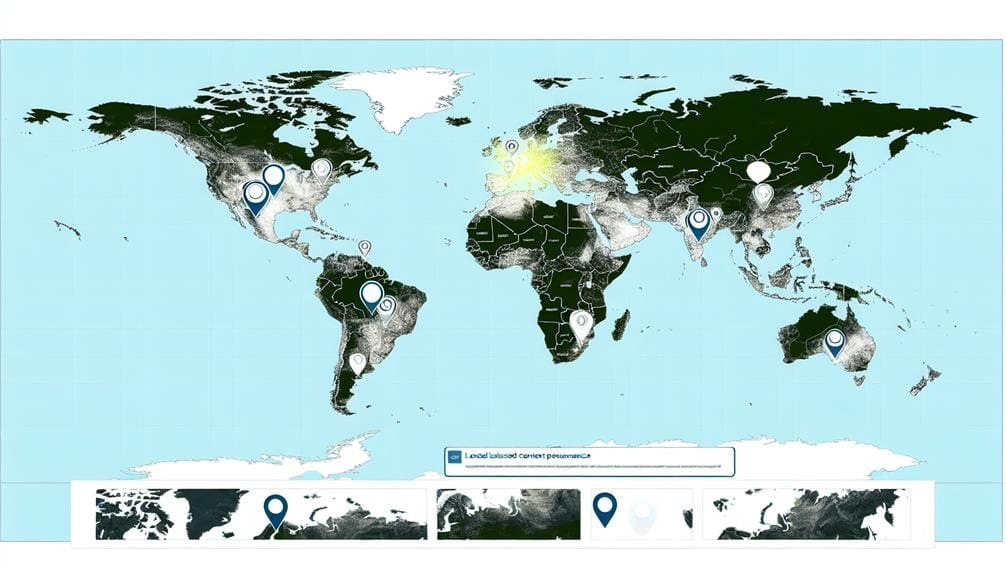Top 9 Strategies for Geo-Targeted Landing Page Success
January 2, 2024 | by Jacob Cavazos

As marketers, we strive to reach the right audience with the right message at the right time. Regarding geo-targeted landing page success, the top 9 strategies are crucial for maximizing the impact of our efforts. From targeting specific audiences based on interest groups to leveraging location data for personalized marketing, these strategies are critical to unlocking higher conversion rates and engagement. But what truly sets these strategies apart and how they can be effectively implemented is where the real value lies.
Target Audience Analysis
Understanding our target audience’s specific interests and preferences is crucial for effective targeting in our geo-targeted landing page strategy. By analyzing consumer behavior and valuable insights from local search results, we can tailor our approach to meet the needs of local customers. Geo-targeted landing pages allow us to deliver local information and services directly to our audience based on their geo-location, ensuring they receive relevant content that resonates with their interests.
Our ad campaigns aim to identify and target audiences based on venue-defined characteristics, allowing us to exclude locations that do not align with our desired target demographic. This precision targeting ensures that our messaging and content are tailored to the predicted demographics and interests of the target audience, maximizing the impact of our geo-targeted landing pages.
Location Exclusion Strategy
Utilizing a location exclusion strategy enables businesses to target their ad campaigns precisely by excluding specific areas where their product or service may not be relevant or in demand, optimizing ad performance and budget allocation. This strategy is essential for geo-targeted landing pages as it ensures the content and ad campaigns are tailored to the most receptive local audiences. Here are the key aspects to consider when implementing a location exclusion strategy:
- Customizing Ad Targeting: Location exclusion allows businesses to refine their ad targeting, ensuring their ads are only shown to audiences in relevant geographic locations.
- Maximizing Resource Allocation: By excluding areas where the product or service may not be in demand, businesses can focus their resources on locations with higher potential for engagement and conversions.
- Enhancing Relevance: This strategy helps deliver specific content to local audiences, ensuring the landing pages contain relevant keywords and signals to search engines.
- Optimizing Search Engine Optimization (SEO): Excluding irrelevant geographic locations from ad targeting contributes to better SEO by presenting more relevant content to users based on their location.
Bid Optimization for Better Locations

When it comes to bid optimization for better locations, there are key strategies that businesses can employ to maximize their ad performance. By adjusting bids based on location, we can target high-value areas and demographics, ensuring our ads reach the most relevant audiences. This approach allows for localized ad performance and helps maximize the impact of our geo-targeted landing pages.
Location-Based Bidding Tips
To optimize ad performance effectively and reach the desired audience, adjusting bids based on location can be a crucial strategy for geo-targeted landing page success. When it comes to location-based bidding, here are some essential tips for bid optimization to better target the local audience:
- Utilize geo-location data to identify high-performing geographic areas.
- Adjust bids to prioritize locations with higher conversion rates and engagement.
- Tailor ad messaging to resonate with local offers and preferences for a personalized experience.
- Collaborate with local businesses to create specific location pages that cater to the local audience’s needs.
Targeting High-Value Areas
Adjusting bids based on location can significantly impact ad performance and reach, mainly when targeting high-value areas for geo-targeted landing page success. By leveraging location data and geo-location, bid optimization for better locations allows advertisers to prioritize high-value regions, maximizing the impact of their campaigns. This strategy helps reach the right audience and drive organic traffic by tailoring specific content to local preferences and search queries. To illustrate, consider the following table showcasing the potential impact of bid optimization for better locations:
| Location | Bid Adjustment | Result |
|---|---|---|
| High-Value | +20% | Increased |
| Medium-Value | +10% | Consistent |
| Low-Value | -10% | Cost-Efficient |
Bid optimization for better locations is crucial for geo-targeted landing page success, allowing advertisers to target specific areas effectively and maximize their ROI.
Localized Ad Performance
Localized ad performance is significantly influenced by bid optimization for better locations, allowing advertisers to target specific areas effectively and maximize their return on investment. This technique involves adjusting bids based on location-specific factors to enhance ad performance. Here’s how bid optimization for better locations affects localized ad performance:
- Maximizing ROI: Adjusting bids for better locations enables advertisers to focus on the most lucrative geographic areas, maximizing their ROI.
- Audience Volume Preservation: Bid adjustments for better locations can mitigate concerns about audience volume loss with specific targeting.
- Targeting High-Performing Areas: Advertisers can prioritize high-performing areas and efficiently reach relevant local audiences through bid optimization for better locations.
- Geo-location Specifics: Bid adjustments for better locations allow for precise targeting, ensuring ads are displayed in areas with high local search volume and relevant local demographics.
Location-Specific Keywords for Paid Ads

When crafting paid ads for geo-targeting, incorporating location-specific keywords such as ‘near me’ or ‘in [city name]’ is essential for optimizing search visibility and effectively reaching specific geographic audiences. By leveraging location-specific keywords, paid ads can align with the search history and geo-location of users, enhancing the likelihood of engagement from local audiences. Thorough keyword research is crucial for identifying the most effective location-specific keywords that resonate with the target audience. Furthermore, utilizing location jargon and terms associated with local landmarks can further improve the performance of paid ads in specific geographic locations.
| Benefits of Location-Specific Keywords in Paid Ads | |
|---|---|
| Optimizes search visibility | Reaches specific geographic audiences |
| Aligns with user geo-location | Enhances engagement from local audiences |
Paid ads with location-specific keywords can provide a seamless user experience by directing users to specific landing pages tailored to their geographic location. These specific landing pages provide unique content relevant to the local business, further enhancing the effectiveness of geo-targeted paid ads. By incorporating location-specific keywords, companies can better predict audience demographics and interests based on their geographical location, resulting in more targeted and impactful paid advertising campaigns.
Audience Prediction by Geography
Leveraging geographic data enables us to predict audience demographics and interests, allowing for more targeted and personalized marketing strategies. Understanding user location through geo-location can predict audience behavior and tailor content to match their interests and needs. Here are four key ways in which audience prediction by geography can significantly impact digital marketing for geo-targeted landing pages:
- Matching Target Audience with Location: Analyzing user location data helps match the target audience with their specific location, ensuring the content is relevant to their geographical context.
- Tailoring Content Based on Common Values and Demographics: Understanding the shared values and demographics in different geographical areas allows for tailoring content to match the interests and preferences of the local audience.
- Personalized Marketing Messages: Leveraging location data enables the creation of customized marketing messages, increasing online visibility and relevance for local businesses.
- Predicting Desirable Demographics and User Information: By analyzing user location data, it is possible to predict desirable demographics and user information, delivering more relevant information to the target audience.
Understanding and predicting audience behavior through geography is essential for creating effective geo-targeted landing pages and delivering a personalized user experience.
Understanding Location Intent

Understanding location intent is crucial for businesses seeking to optimize their landing page performance. By analyzing the intent behind user searches based on their geographic location, companies can tailor their content to meet diverse audiences’ specific needs and interests. This approach allows for targeted and personalized messaging, ultimately improving user engagement and driving better results.
Intent and Location
By analyzing consumer behavior and preferences from past locations visited, we gain valuable insights into location intent, allowing us to tailor content and ads accordingly. Understanding location intent is crucial for optimizing geo-targeted landing pages. Here’s how we can leverage intent and location to increase visibility and engage the target audience:
- Analyze search volume and user location data to identify patterns in location intent.
- Create location-specific landing pages catering to local businesses’ needs and preferences.
- Capitalize on geographic-specific events to align content with users’ intent in specific locations.
- Employ geo-targeting to optimize landing pages and increase relevance, ultimately enhancing the user experience and ROI.
User’s Geographical Context
Incorporating the user’s geographical context is essential for crafting personalized and targeted content that resonates with their location-based preferences and interests. Understanding a user’s geographical context allows for delivering tailored experiences, especially on mobile devices, where geo-location plays a crucial role. By leveraging location data, businesses can better cater to the needs of their local audience, improve local SEO, and effectively reach their service area. Geo-targeted landing pages can be optimized to align with users’ location-based preferences, increasing the relevance and impact of the content. Analyzing the user’s geographical context enables the prediction of demographics, interests, and behaviors, empowering businesses to adjust ad targeting and incorporate location-specific keywords to enhance visibility and engagement with the local audience.
Analyzing Consumer Behavior
We gain valuable insights into the preferences and tendencies exhibited in different geographic locations through careful consumer behavior analysis. We focus on specific data to understand local preferences and behaviors when analyzing consumer behavior for geo-targeted landing pages. This allows us to tailor landing page content and offers to match the preferences of the local audience effectively. Here are four critical considerations for analyzing consumer behavior in geo-targeted landing page strategies:
- Identifying Patterns: We analyze location-specific data to identify patterns in consumer actions and decision-making processes, which helps create targeted content.
- Adapting Marketing Strategies: By evaluating consumer response to targeted advertising and messaging based on location, we can adjust and refine our marketing strategies for better engagement.
- Optimizing Keywords: Analyzing consumer behavior helps identify local keywords and search terms that can be incorporated into the landing page content to improve search visibility.
- Improving Conversion Rates: Consumer behavior analysis enables us to understand the factors influencing local conversion rates, allowing for the optimization of landing page content to increase conversions.
Geo-Specific Landing Page Creation

Understanding the insights gained from analyzing consumer behavior, we can now delve into the strategic process of creating geo-specific landing pages to target and engage local audiences effectively. Geo-specific landing pages are crucial for businesses that increase relevance and engagement with potential customers in specific locations. Companies can significantly enhance lead generation and conversion rates by tailoring content and messages to suit the needs and preferences of particular regions or cities. Leveraging geo-location data allows for personalizing marketing messages, ensuring the content resonates with local audiences. Additionally, utilizing location-specific keywords and geo-targeting based on consumer search queries further enhances the effectiveness of these landing pages. Tracking metrics such as open rates, click-through rates, and in-store conversions are essential to measure the impact of geo-specific landing pages. The table below overviews the critical considerations for creating effective geo-specific landing pages.
| Key Considerations | Description |
|---|---|
| Tailoring content and messages | Customize content to suit the needs and preferences of specific regions. |
| Leveraging geo-location data | Personalize marketing messages based on the location of the audience. |
| Using location-specific keywords | Incorporate keywords that are specific to the targeted geographical area. |
| Geo-targeting based on search queries | Optimize landing pages based on the search queries of local consumers. |
| Tracking effectiveness | Measure impact through tracking metrics such as open rates and conversions. |
Leveraging Geographic Events
Leveraging Geographic Events enhances the relevance and timeliness of geo-targeted marketing strategies, allowing businesses to connect with local audiences more effectively. Here are four essential ways to leverage geographic events for geo-targeted landing page success:
- Aligning with Local Festivals and Holidays: By aligning promotions with local festivals, holidays, or community gatherings, businesses can resonate with the audience and drive engagement. For example, a local business in New York can create a geo-targeted landing page specific to the city’s annual Thanksgiving parade, offering promotions related to the event.
- Sensitivity to Cultural Context: It’s crucial to stay sensitive to the cultural and social context of the geographic event to ensure the campaign’s success. Understanding the local customs and traditions can help create more relevant and appealing content for the landing page.
- Optimizing Geo-Targeted Landing Pages: Geo-targeted landing pages can be optimized to reflect the relevance of the geographic event. This creates a personalized experience for visitors, making them feel more connected to the local business.
- Adding Timely Dimension: Leveraging Geographic Events adds a dynamic and timely dimension to geo-targeted marketing strategies, helping businesses connect with local customers more effectively. It makes the marketing efforts more current and in tune with the local community.
Frequently Asked Questions
How Effective Is Geo-targeting?
Geo-targeting is highly effective, offering advantages like market segmentation and personalization impact. Challenges include consumer response and data privacy. It optimizes marketing strategies, improves location accuracy, and helps combat local competition while expanding global reach.
What Are the Three Types of Geo Targeting?
The three types of geo-targeting are targeting specific audiences, defining a radius for targeting, and adjusting bids for better locations. These strategies are essential for location-based advertising, geographic segmentation, and targeted marketing to reach specific demographics effectively.
How Do I Optimize My Landing Page?
To optimize your landing page, we focus on conversion optimization, user experience, mobile responsiveness, call to action, A/B testing, local keywords, analytics tracking, visual design, load speed, and content relevance. It’s essential for driving results.
What Are Geo-Targeted Landing Pages for SEO?
Geo-targeted landing pages for SEO involve local optimization, targeted audience focus, location-based content, and regional marketing. Businesses can achieve localized messaging and regional advertising success by leveraging geographic segmentation, local SEO, and area-specific campaigns.
RELATED POSTS
View all



